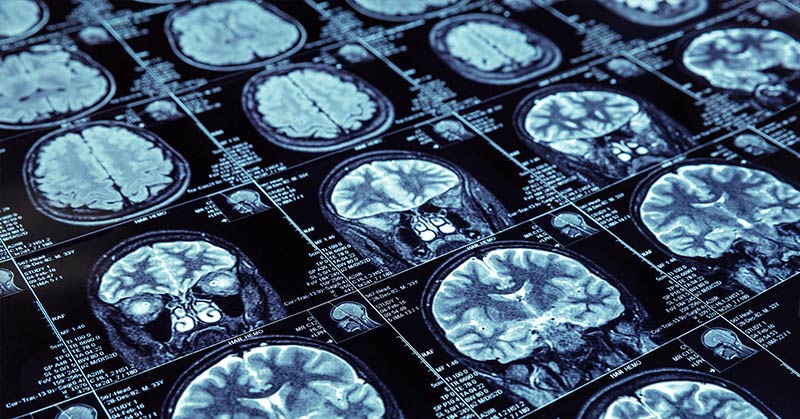[ad_1]
Alzheimer’s is a devastating disease for anyone who experiences it. Mothers, fathers, grandparents, all of whom seemed strong and invincible are suddenly struggling to function. They can’t remember appointments, the last time their family visited, and, at later stages, even their children’s names. It’s painful for those who endure this disease, and heartbreaking for their families to watch. Once the symptoms begin, they only worsen over time. It’s a long road of decline with little hope for improvements. Medications often only address symptoms and do not slow the progression. However, there has been some recent progress.
Researchers have been studying Alzheimer’s for potential treatments for a long time, and they’ve discovered a new method that shows promise: electromagnetic waves.
The MemorEM Head Cap Study
The first study to test this method was small, with only eight patients, and lasted two months. This small size limits the researchers from declaring this an official treatment, but the results are profound enough to warrant a larger trial.
The eight volunteers had mild to moderate forms of Alzheimer’s disease. For the study, they were fitted with a MemorEM head cap. It looks like a cross between a swimming cap and a helmet, and it emits a specially-developed flow of electromagnetic waves through the participant’s skull. The contraption is light, transportable, and the patients can be easily treated at home. They were required to wear the cap twice a day, for an hour each time.
The MemorEM head cap is developed by NeuroEM Therapeutics. Two of the authors behind the study founded the company, so we should note some vested interest there.
However, the research has proven to be worthy of further investigation as seven of the eight volunteers experienced “enhanced cognitive performance.” There were no negative side effects like headaches or brain abnormalities from the treatment.
“Perhaps the best indication that the two months of treatment was having a clinically-important effect on the Alzheimer’s disease patients in this study is that none of the patients wanted to return their head device to the University of South Florida/Byrd Alzheimer’s Institute after the study was completed,” says biologist Gary Arendash, CEO of NeuroEM Therapeutics.
Arendash goes on to say that one of the patients had said, “I’ve come back.” [1]
Previous Studies
This is a huge sign of hope after the failure of medicinal drugs to reverse the effects of the disease. Pre-clinical studies had shown the cap preventing and reversing cognitive impairment in old mice.
So far, it seems that the cap can break up the toxic amyloid-beta and tau proteins in the brain that have been linked to the effects of Alzheimer’s. The electromagnetic waves can destabilize the weak hydrogen bonds that hold these proteins together. Unlike other drugs, this process is direct and effective.
Scientists believe that the proteins “clog up” the brain by suffocating and damaging vital neurons for cognition, memory, and speech. [2]
To Measure Dementia: The ADAS-Cog Test
The Alzheimer’s Disease Assessment Scale-Cognitive Subscale test is commonly used to measure cognition in clinical trials and studies for drugs and treatments of the disease. It consists of 11 parts to measure the patient’s cognitive functions and non-cognitive functions like behaviors and mood.
Its questions may include naming objects, recalling words from a list, following commands, drawing progressively difficult shapes, and other tests while the instructor evaluates the participant’s speech abilities.
The ADAS-Cog test determines the extent of the decline, an important piece of data for researchers of clinical trials. [3]
The average scoring for a healthy person is five on the ADAS-Cog test, and 31 for patients with Alzheimer’s. Seven out of eight of the volunteers in the MemorEM head cap trial had their score shift down four points after the two-month trial.
Four points may not seem like a lot, but it is actually the cognitive decline an Alzheimer’s patient might experience ina year. It’s fantastic to think that a year’s worth of regression was undone in only two months!
The Treatment is Rising in Renown
The approach of using electromagnetic waves to treat the disease is being tested by other companies, including Neuronix, which uses transcranial magnetic stimulation in the brain through the cap. [4] So far, the process is promising.
“Despite significant efforts for nearly 20 years, stopping or reversing memory impairment in people with Alzheimer’s disease has eluded researchers,” says neuroscientist Amanda Smith from the University of South Florida.
“These results provide preliminary evidence that TEMT administration we assessed in this small Alzheimer’s disease study may have the capacity to enhance cognitive performance in patients with mild to moderate disease.” [5]
The next step for the MemorEM head cap is bringing it into a longer trial with more volunteers. NeuroEM Therapeutics plans a clinical trial with 150 participants to begin later this year. If this trial goes well, the cap may become approved for public use. [6]
Sources
- Gary Arendash. A Clinical Trial of Transcranial Electromagnetic Treatment in Alzheimer’s Disease: Cognitive Enhancement and Associated Changes in Cerebrospinal Fluid, Blood, and Brain Imaging https://content.iospress.com/articles/journal-of-alzheimers-disease/jad190367 September 3, 2019
- Gary Arendash. Electromagnetic field treatment protects against and reverses cognitive impairment in Alzheimer’s disease mice. https://www.ncbi.nlm.nih.gov/pubmed/20061638 2010
- Donald J. Connor and Marwan N. Sabbagh. Administration and Scoring Variance on the ADAS-Cog https://www.ncbi.nlm.nih.gov/pmc/articles/PMC2727511/ November 1, 2009
- Neuronix https://www.sciencealert.com/small-trial-reverses-a-year-of-alzheimer-s-in-just-two-months-in-seven-patients
- IOS Press. Alzheimer’s memory loss reversed by new head device using electromagnetic waves https://www.eurekalert.org/pub_releases/2019-09/ip-am091719.php September 17, 2019
- David Nield. Small Trial Reverses a Year of Alzheimer’s Cognitive Decline in Just Two Months https://www.sciencealert.com/small-trial-reverses-a-year-of-alzheimer-s-in-just-two-months-in-seven-patients September 21, 2019
[ad_2]
Source link
